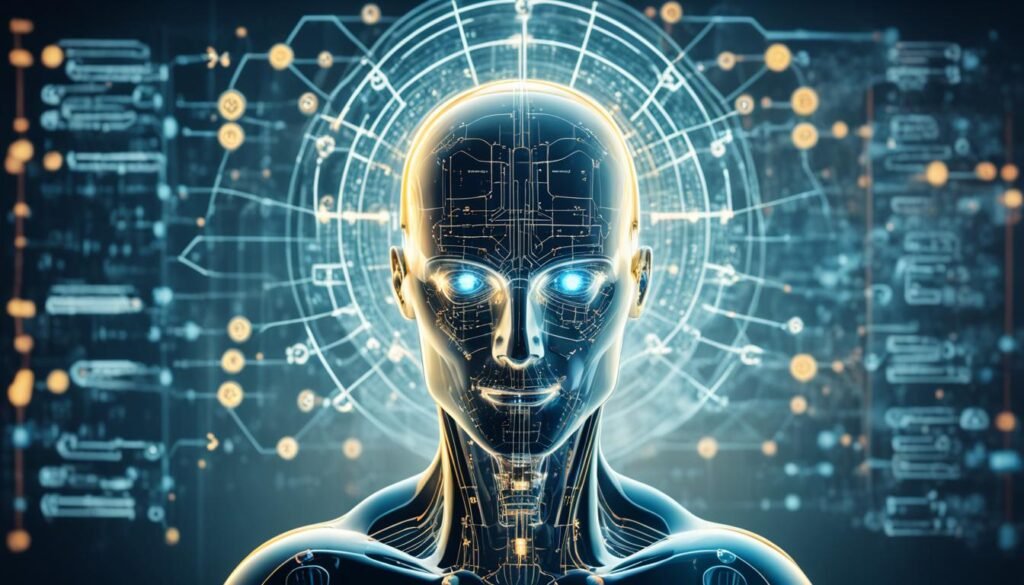Did you know Google DeepMind’s AI systems, AlphaProof and AlphaGeometry 2, recently won a silver medal at the International Mathematical Olympiad? They solved 4 out of 6 complex math problems. This shows how far AI has come in solving tough problems once thought only humans could handle.
This article will look into how AI is changing problem-solving. We’ll talk about the latest breakthroughs, how it uses natural language, and how it works with big data. You’ll see how this tech is changing how we solve complex problems in different fields.
Key Takeaways
- Google DeepMind’s AI systems, AlphaProof and AlphaGeometry 2, achieved a silver medal-equivalent performance at the International Mathematical Olympiad.
- These AI models successfully solved 4 out of 6 complex math problems, showcasing a significant leap in AI’s problem-solving capabilities.
- The integration of classic AI techniques with modern deep learning methods is a key trend in tackling real-world engineering challenges.
- AI can automate repetitive tasks, analyze data, and provide personalized experiences, driving innovation across various industries.
- The field of AI and machine learning is projected to witness substantial growth in the coming years, offering diverse career opportunities.
The Promise of AI in Solving Math Problems
AI systems are now solving complex math problems like never before. Google’s DeepMind has made big strides in this area. Their work shows how far AI has come.
Recent Breakthroughs with AlphaProof and AlphaGeometry 2
DeepMind’s AlphaProof and AlphaGeometry 2 are AI models designed for tough math. AlphaProof uses reinforcement learning to prove statements in Lean, a programming language. AlphaGeometry 2 is great at solving geometry problems, like figuring out angles and distances.
These AI models have done amazingly well. They solved four out of six problems from the International Mathematical Olympiad (IMO). This includes the toughest question. No AI had done this well before.
“DeepMind applied both models to six problems from the International Mathematical Olympiad, solving four out of six problems.”
Creating AlphaProof and AlphaGeometry 2 took a lot of work from experts. AlphaProof was worked on by 17 people. AlphaGeometry 2 and other models had teams of 7 each. Four people managed the project, and 13 checked the language system. Plus, 45 people helped with advice and support.
The success of these AI models is a big deal. It shows how machine learning and deep neural networks can solve hard math problems. As AI gets better, we’ll see more big wins in math and formal reasoning.
The Challenges of Complex Math Problems for AI
Solving complex math problems is tough for AI. These problems need advanced logical reasoning, abstraction, and hierarchical planning. AI finds it hard to make and use complex abstractions, do formal mathematics, set goals, backtrack, and try new paths.
There’s a big problem: AI has less formal mathematics data than natural language data online. This makes it tough for AI to solve advanced math problems. It can’t easily switch between informal and formal math concepts.
- AI needs to turn natural language into precise formal mathematics to solve complex math problems.
- Creating AI that can plan and abstract like humans is a big challenge for researchers.
- Advances in reinforcement learning and large language models could help AI with complex math problems.
Despite the challenges, AI has made big strides. Systems like AlphaProof and AlphaGeometry 2 have solved hard math problems. This shows AI can help mathematicians explore ideas, find new ways to solve problems, and improve their thinking.

Automating the Translation of Natural Language to Formal Math
A key step in making AI solve hard math problems was the creation of the Gemini AI model. This model can turn math problems in everyday language into formal statements. These are easier for AI to understand. It works with Google DeepMind’s AlphaZero to check or prove millions of math problems. The more problems it solves, the better it gets at solving harder ones.
The Role of Gemini AI and Reinforcement Learning
Turning data into formal language is a big step forward for math. It makes sure math results are correct and helps humans and AI work together better. Research shows that large language models can correctly translate 25.3% of math competition problems into formal language. Also, the auto-formalization process boosted the success rate in solving math problems from 29% to 35% compared to humans.
The goal is for AI to find new math areas that humans don’t know about yet. Smaug123, a user, said,
“If success rates reach 100%, an artificial intelligence agent could potentially win an International Maths Olympiad gold medal.”
Using machines to prove things has many uses, like checking software, financial trading, and designing hardware.

Applying the model to math research, often in LaTeX, is tough because of its unique symbols and functions. But, progress in natural language processing, formal math, and reinforcement learning with Gemini AI is promising. The future of AI solving problems looks good.
can ai solve complex problems
Artificial intelligence (AI) has made big steps forward in recent years. AI models are now great at tasks like understanding language, recognizing images, and playing games. But, AI has had trouble with complex problems that need logical thinking, like advanced math.
Recently, companies like Google DeepMind have made big leaps in this area. Their AI systems, AlphaProof and AlphaGeometry 2, solved four out of six problems from the International Mathematical Olympiad. This is a huge deal for AI, as it’s the first time any AI has done this well.
This is a big win for machine learning and AI. These math problems are tough because they need complex thinking and planning. The success of AlphaProof and AlphaGeometry 2 shows AI is getting better at solving hard problems that need smart thinking.
But, there’s still a lot to figure out. Making AI solve complex problems consistently is a big challenge. We need more work in machine learning, making AI understandable, and dealing with unclear situations. Still, these recent wins give us hope that AI could solve even the toughest math and logical problems someday.
“The success of AlphaProof and AlphaGeometry 2 suggests that AI and cognitive computing are making strides in solving complex problems that require sophisticated reasoning capabilities.”

The Symbiosis of AI and Big Data
In today’s digital world, big data is growing fast, offering both challenges and chances for companies. As data gets bigger, faster, and more varied, old ways of analyzing it can’t keep up. This is where artificial intelligence (AI) and its deep learning step in, starting a new era of solving problems.
AI can handle, understand, and make sense of huge amounts of data. Deep learning finds complex patterns, predicts outcomes, and automates tasks. These skills are key to finding valuable insights in big data.
How AI Unlocks Insights from Massive Data Sets
The link between AI and big data is changing how we make decisions in many fields. AI uses big data’s wealth to:
- Spot patterns and trends missed by old methods
- Give predictions to help make better decisions
- Automate tasks, making things more efficient
- Customize solutions for each user, improving their experience
- Find new insights and spark innovation in research and product development
AI’s problem-solving and the huge data we have today could lead to groundbreaking solutions. As AI and big data work together, companies in different fields are ready to start a new era of making decisions with data.
| Key Benefit | Example |
|---|---|
| Detecting patterns and trends | AI algorithms can find hidden patterns and trends in large datasets, like in financial markets or how people behave. |
| Predictive insights | Using big data and machine learning, AI can predict future events better, like who might leave a service or what might break next. |
| Data processing and extraction | AI can automate data processing and extraction, making things more efficient and reducing mistakes. |
| Personalization | AI looks at user behavior and preferences in big data to offer personalized recommendations, making things better for users. |
| Driving innovation | AI and big data together can find new insights and patterns, leading to scientific discoveries and new products. |
As data grows and gets more complex, the partnership between artificial intelligence and big data will be key. It will unlock data’s full potential and help solve problems in various industries.

Accelerating Optimization with Machine Learning
In today’s fast-paced business world, companies face complex optimization challenges. These challenges can greatly affect their operations and profits. From efficient package routing to effective resource allocation, solving these problems quickly and accurately is key. Luckily, machine learning is changing how we tackle optimization, making things faster and more efficient.
Researchers from MIT and ETH Zurich have made a big leap forward. They’ve developed a machine learning approach to speed up solving complex optimization problems. These problems often take a long time to solve, but machine learning can make a big difference. By using data to simplify a key step, they’ve made solving these problems 30-70% faster without losing accuracy.
This new approach lets companies make general-purpose MILP solvers work better for their specific problems. This means faster and more effective solutions for many areas like logistics, manufacturing, finance, and healthcare. Machine learning and optimization together are changing how companies make decisions and leading to better business results.
| Optimization Challenge | Industry | Potential Impact |
|---|---|---|
| Efficient package routing | Logistics | Reduced transportation costs, improved customer service |
| Optimal resource allocation | Manufacturing | Increased productivity, reduced waste |
| Personalized treatment plans | Healthcare | Improved patient outcomes, reduced healthcare costs |
| Portfolio optimization | Finance | Higher returns, reduced risk |
As machine learning and optimization continue to grow together, we’ll see more amazing changes. Companies will use data to make better decisions, leading to more efficiency and success. This will help businesses compete better in a tough market.
“The integration of AI and machine learning in drug discovery and clinical development has the potential to transform the ability to invent new medicines at a faster pace.”
The Future of AI in Problem-Solving
AI technology is getting better and will soon work better with complex problems. It might make decisions on its own, giving us sharper insights. The work of Google DeepMind’s AlphaProof and AlphaGeometry 2 shows how AI can tackle tough problems.
This could lead to exciting work between humans and AI. AI can do routine tasks, give insights from lots of data, and help with decisions quickly. Humans add things like intuition, creativity, and understanding to the mix, making AI better.
Looking at how AI and humans work together opens up new chances for innovation. Working together, humans and AI solve problems better, using each other’s strengths to tackle many challenges.
“A study by Fabrizio dell’Acqua and Ethan Mollick in partnership with BCG revealed that consultants using AI outperformed those without access by 43% in terms of completing tasks faster, number of tasks completed, and quality of outputs in problem-solving tasks.”
But, making AI solve problems all by itself is hard. It needs to understand the problem, sort it out, and work well with other AI systems. AI still can’t fully grasp the complexity of some problems and might make mistakes or not get the goals right.
Businesses should look into new tech like AI to stay ahead. AI helps with complex problems by gathering and analyzing data, but humans are still key in making decisions.
The future of AI in solving problems will be about finding a balance. AI and human smarts need to work together to keep being creative and diverse in solving complex issues.
Conclusion
AI has made huge strides, especially in deep learning and natural language processing. This has opened doors to solving complex problems that were hard before. Systems like Google DeepMind’s AlphaProof and AlphaGeometry 2 have made big leaps in math problems, like the International Mathematical Olympiad.
As AI keeps getting better, working with complex problems will become easier. This means humans and machines will work together more closely. There are still hurdles to jump over, but the future of AI in solving problems looks bright. It could lead to new discoveries and innovations in many areas.
AI can help humans make better decisions by using its strengths. This balance between human and machine intelligence is key. By using can ai solve complex problems, machine learning algorithms, and cognitive computing, we can make a better world. AI and problem-solving can work together to solve big challenges.
FAQ
Can AI solve complex problems?
AI models can create essays and text easily but struggle with complex math. Google DeepMind’s AlphaProof and AlphaGeometry 2 have made progress in solving tough math problems.
What are the recent breakthroughs in AI solving math problems?
Google DeepMind’s AlphaProof and AlphaGeometry 2 are AI systems that solve complex math problems. They solved four out of six problems from the International Mathematical Olympiad, including the hardest one, earning a silver medal.
What are the challenges for AI in solving complex math problems?
AI faces big challenges in solving complex math problems. These problems need advanced reasoning, planning, and trying different paths. Current AI tech finds these hard.
How has the development of the Gemini AI model helped in solving complex math problems?
The Gemini AI model is key in solving complex math problems. It turns math problems into formal statements AI can process. It works with Google DeepMind’s AlphaZero to prove or disprove math problems.
How can AI be used to solve complex problems?
AI is great at generating text but struggles with complex problems like advanced math. Yet, Google DeepMind’s AlphaProof and AlphaGeometry 2 have made big strides, showing AI’s potential in solving complex problems.
How is the integration of AI and Big Data helping to solve complex problems?
AI’s growth, especially in deep learning and natural language processing, is opening new ways to solve complex problems. The link between AI and Big Data is changing how we tackle complex issues and make decisions across industries.
How can machine learning accelerate the process of solving complex optimization problems?
Researchers from MIT and ETH Zurich have used machine learning to speed up solving complex optimization problems. This approach helps companies solve their specific optimization challenges faster and better.
What is the future of AI in complex problem-solving?
AI will keep getting better at solving complex problems. It might become more independent in making decisions, offering more precise and insightful analysis. The work on Google DeepMind’s AlphaProof and AlphaGeometry 2 marks a big step forward in solving complex problems.
